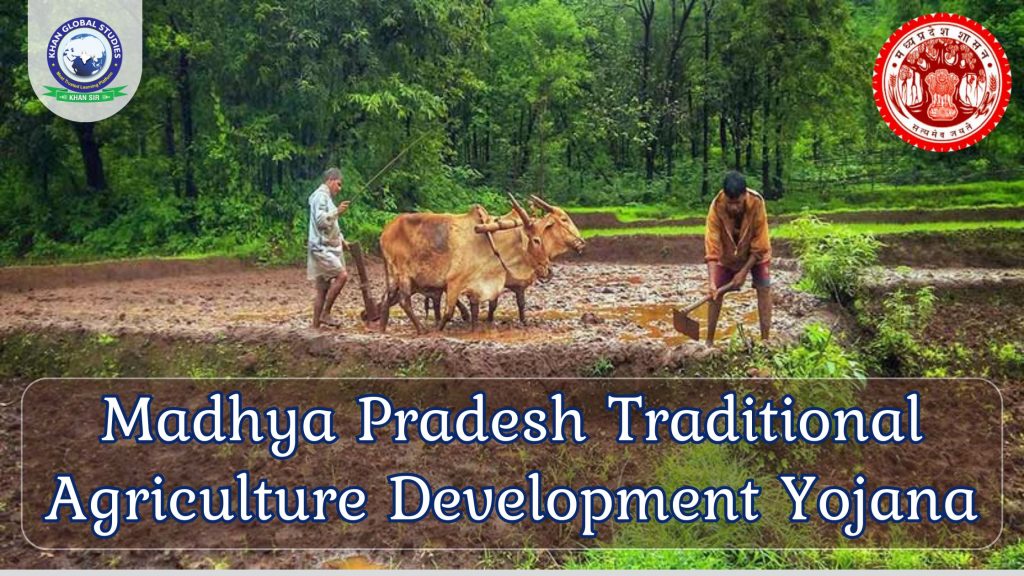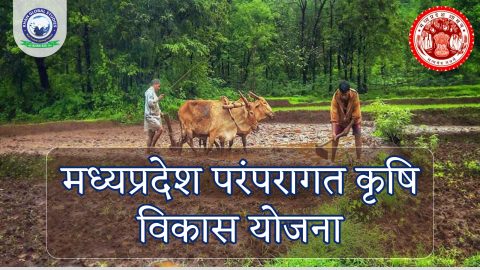The Madhya Pradesh government has launched the “Madhya Pradesh Traditional Agriculture Development Scheme” making a major change in its agricultural policy. The scheme aims to reduce dependence on chemical farming and encourage farmers to adopt sustainable and environmentally friendly agricultural practices.
Main Objectives of the Scheme
- Promoting organic farming: Excessive use of chemical fertilizers and pesticides harms soil fertility and the environment. The scheme aims to encourage farmers to adopt organic farming, which increases soil fertility, keeps the environment clean and provides consumers with healthy food.
- Increasing farmers’ income: With the increasing demand for organic products, farmers can get better prices for their produce. The scheme also helps farmers to produce value-added products and get better market access.
- Making agriculture sustainable: Traditional agricultural practices, such as rainwater harvesting, mixed cropping and use of organic manure, improve soil fertility and water conservation. The scheme helps farmers adapt to climate change and adopt sustainable agricultural practices.
Benefits of the Scheme
- Financial Assistance: Under this scheme, farmers are provided financial assistance for various activities for organic farming, such as training, certification and soil testing.
- Training and Capacity Building: Farmers are provided training on organic farming methods, the use of organic fertilizers and pesticides, and the production of value-added products.
- Market Access: This scheme helps farmers to get better market access for their produce. The government organizes agricultural fairs and exhibitions and connects farmers to online platforms.
Implementation of the scheme
The scheme is being implemented by the State Agriculture Department. Farmers can apply for the scheme through various agricultural development offices or online portals.
Measures to make the Traditional Agriculture Development Scheme successful
The Madhya Pradesh Traditional Agriculture Development Scheme is a commendable initiative, but some measures can be taken to ensure its long-term impact:
- Awareness Campaign: There is a need to increase awareness about the scheme among farmers, especially small and marginal farmers. The government should widely publicize the scheme through radio programs, farmer seminars and agricultural extension services.
- Strong Market Linkages: It is important to establish a strong market mechanism for organic products. The government should make efforts to strengthen Farmer Producer Organisations (FPOs) and provide easy access to organic products to consumers. Online platforms and specialized stores for organic products should be promoted.
- Simplifying the Certification Process: The organic certification process is considered complex and time-consuming. It needs to be simplified so that farmers can easily obtain certification. The government should consider subsidizing certification fees and making the certification process online.
- Long-term Research and Development: Continuous research and development in organic farming methods is essential. The government should focus on developing new organic farming techniques and training farmers in collaboration with agricultural universities and research institutes.
- Promoting Success Stories: Sharing stories of successful organic farmers can inspire other farmers. The government should prepare videos and case studies of successful farmers and share them on the agriculture department website and social media platforms.
Towards a Sustainable Future
The Madhya Pradesh Traditional Agriculture Development Scheme is a positive step that will help promote sustainable agriculture in the state. The success of the scheme requires a focus on farmer participation, strong market linkages, a simple certification process, continuous research and development and dissemination of success stories. This scheme will not only improve the income of farmers but will also contribute to soil fertility, environmental protection and food security. Adoption of traditional agricultural practices is important for a healthy and sustainable future and Madhya Pradesh Traditional Agriculture Development Scheme is a meaningful effort in this direction.
Addressing Upcoming Challenges
The Madhya Pradesh Traditional Agriculture Development Scheme may be promising, but it needs to be prepared to face future challenges. Let us see how these challenges can be addressed:
- Climate Change: Erratic rainfall patterns and rising temperatures due to climate change may pose a threat to organic farming. The government should promote drought-resistant crops and encourage farmers to adopt climate-smart agricultural practices, such as rainwater harvesting and mulching.
- Availability of Organic Inputs: It is important to ensure adequate availability of organic manure and organic pesticides. The government can run programmes to promote vermicomposting and bio-organic pest control methods. Organising farmers into groups will help in buying organic inputs in bulk.
- Cost vs Benefit Analysis: Organic farming may have higher initial costs than conventional farming. The government should consider bridging this gap by providing subsidies and financial assistance to farmers. Also, ensuring better market prices for organic produce will be important in attracting farmers.
Building a Collaborative Ecosystem
The success of the Madhya Pradesh Traditional Agriculture Development Scheme requires strong collaboration among various stakeholders:
- Farmer Organizations: Farmer organizations can play a vital role in promoting the scheme and providing farmers an opportunity to learn from each other.
- Non-Governmental Organizations (NGOs): NGOs can play a vital role in providing training to farmers, assisting them in the organic certification process, and making consumers aware of organic products.
- Private Sector: Private sector companies can contribute to strengthening the supply chain of organic inputs, expanding the market for organic products, and providing technical support to farmers.
Conclusion
The Madhya Pradesh Traditional Agriculture Development Scheme is an important initiative that can benefit both farmers and the environment by promoting sustainable agriculture. The success of the scheme requires farmer participation, strong market linkages, a simple certification process, continuous research and development, addressing challenges that arise, and building a collaborative ecosystem. The scheme can serve as a model not only for the farmers of Madhya Pradesh but for the entire country, leading to the future of sustainable agriculture.





